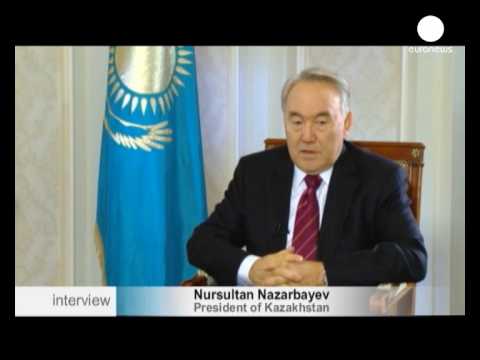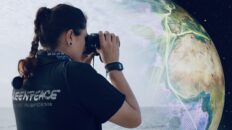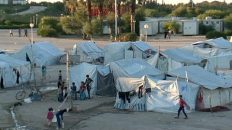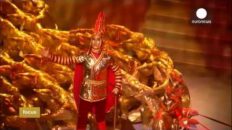Nursultan Nazarbayev has ruled Kazakhstan as the oil-rich central Asian nation’s president since its independence in 1991. The world’s largest land-locked state is taking a heightened interest in the turbulent region’s problems since it has taken up the chairmanship of the intergovernmental Organization for Security and Co-operation in Europe (OSCE). Euronews spoke to President Nazarbayev in Almaty.
Denis Loktev, euronews: “Mr President, welcome to euronews. Kazakhstan’s presidency of the OSCEcoincides with a worsening of several regional conflicts. Have you managed to prepare an effective plan of action?”
President Nazarbayev: “Well, our priority will be to try to strike a balance in all three areas of the OSCE’s responsibilities.”
“The first is the military-political part, and Kazakhstan has some proposals there. We support the Corfu process that has started with the declaration that we can work to deepen, to expand the responsibility of the OSCE, to build a new security architecture in all our countries.”
“The second part is the economy, and, of course, the main interest in Europe and the world lies in energy. Kazakhstan has huge energy resources. We are transporting them through Russia to the Black Sea, through the Caucasus to Europe. Our outlook is immense, and we have an important role to play. Our cooperation is developing: today about 25 percent of Europe’s oil comes from Kazakhstan. In addition, our geographical position between Europe and Asia reiterates our important transit and transportation role in the region.”
“And thirdly, in the human dimension – we are supporting and developing fundamental freedoms and human rights, and we want to pay more attention to the importance of tolerance, being, ourselves, a multi-ethnic and multi-confessional state where 130 ethnic groups of 46 religious denominations have lived in friendship and harmony for years.”
euronews: “Which of the regional conflicts, regional hot spots, do you consider demands the most attention?”
President Nazarbayev: “Today, of course, the most serious regional problem is Afghanistan. There is also the nuclear situation in Iran. This debate continues. The world community has not received a definite response yet. The ‘frozen conflicts’ also fall within the scope of OSCE liability: the Nagorno-Karabakh, Transnistria, Georgia-Abkhazia and Georgia-South Ossetia conflicts. The Balkan issues remain, as well. And the main challenge, of course, is that of terrorism, extremism and drug trafficking.”
euronews: “In your opinion, what, specifically, should be done to improve matters in Afghanistan?”
President Nazarbayev: “I think that all OSCE States are concerned that after eight years of actions we are unable to achieve a calm and peaceful life for the Afghan people. It will be a major concern for the OSCE. Kazakhstan is involved as a partner in this process and as the OSCE chairman.”
“The most important thing – above all – is to take decisions in order to restore the economy. People have been fighting there since 1979 – for 30 years already. A man born 30 years ago never held anything but a rifle in his hands. The whole economy is completely ruined. Until we rebuild the economy, until we give work to the people, the only source of their livelihood will be drug trafficking. That is a global concern.”
euronews: “You’ve mentioned, Mr President, the OSCE’s so-called human dimension – the promotion of democracy and protecting human rights in all countries of the region. How important for you are those goals, compared with the issues of security and cooperation?”
President Nazarbayev: “Well, that’s emphasized in the founding documents of the OSCE. Naturally, we will adhere to this. But, like I said, all the areas should be balanced. There shouldn’t be distortions, as have occurred in the past, when one issue gets priority over another.”
“We’re a young democratic state. We’re probably on the beginning of our path, whereas Europe, the Western countries, have been living in this arrangement for centuries. Therefore, democracy for us is not the beginning of the path, it is the end. And while preparing for the OSCE presidency, we’ve made a further step, changing the laws on elections and expanding opportunities for political parties and media freedom.”
euronews: “That’s not that critics say. They see no improvement with the freedom of press and parliamentary elections in Kazakhstan. Journalists and human rights activists complain of harassment by the authorities.”
President Nazarbayev: “We acknowledge that perhaps we have not yet reached the same level that developed nations have achieved – and it’s not just us, but many post-Soviet countries. But people aren’t ready for drastic changes. Their income, their wages are low. Therefore, we worry that democracy may be perceived as the opposite, as making people’s lives deteriorate. It happened in Russia, if you remember. Forty percent of the people were poor and unemployed, but everywhere there was a talk about democracy. And in many regions democracy became associated with poverty and misery. When our neighbors in Kyrgyzstan tried to establish complete freedom of democracy, it led to such cataclysms that they still can’t recover. We see this in Ukraine, we see this in Georgia. Our people see it. We say the economy first, then politics. We need to move gradually.”





